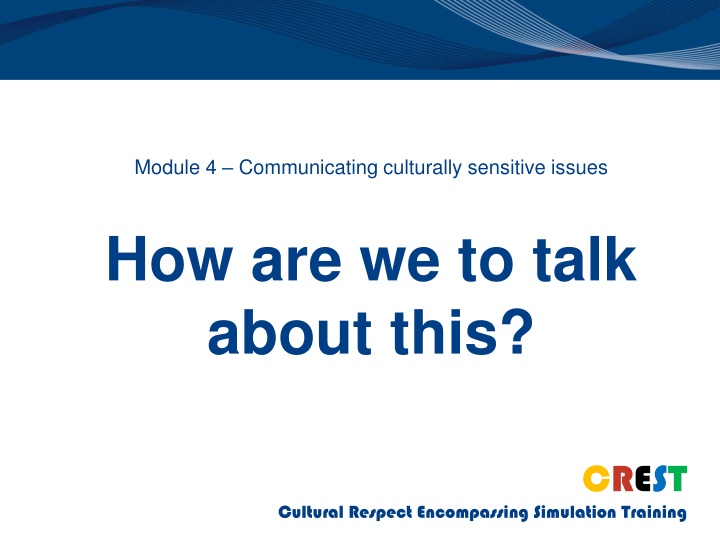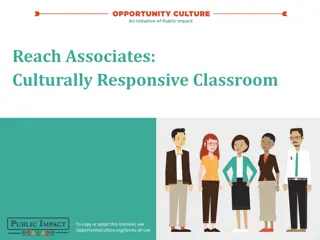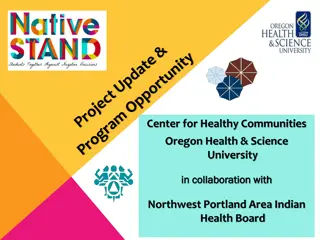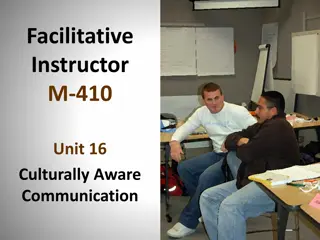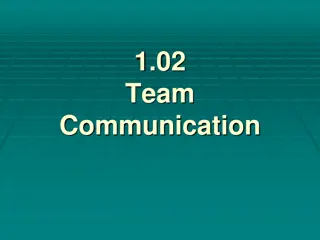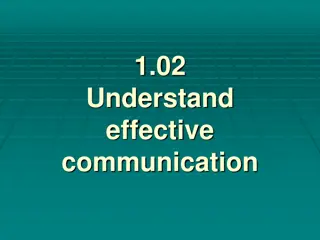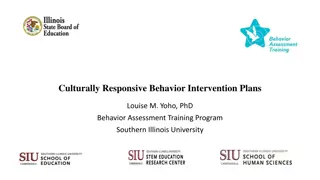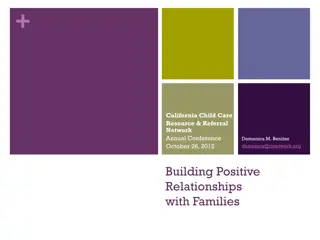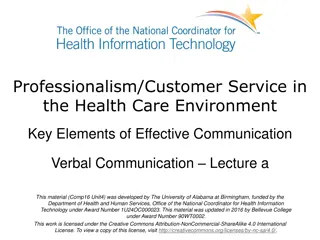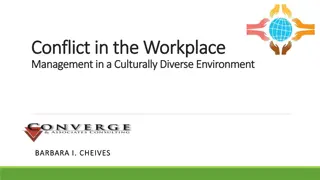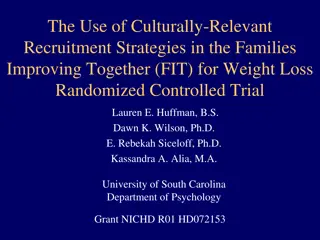Effective Communication in Culturally Diverse Healthcare
Discover the nuances of culturally sensitive issues impacting diverse patients' health. Explore factors influencing identities, relationships, and health belief systems. Gain insight into distinct health inequalities experienced by CALD patients and strategies for respectful engagement.
Download Presentation

Please find below an Image/Link to download the presentation.
The content on the website is provided AS IS for your information and personal use only. It may not be sold, licensed, or shared on other websites without obtaining consent from the author.If you encounter any issues during the download, it is possible that the publisher has removed the file from their server.
You are allowed to download the files provided on this website for personal or commercial use, subject to the condition that they are used lawfully. All files are the property of their respective owners.
The content on the website is provided AS IS for your information and personal use only. It may not be sold, licensed, or shared on other websites without obtaining consent from the author.
E N D
Presentation Transcript
Module 4 Communicating culturally sensitive issues How are we to talk about this? CREST Cultural Respect Encompassing Simulation Training
This project was made possible using funding from Health Workforce Australia This project was made possible using funding from Health Workforce Australia CREST Cultural Respect Encompassing Simulation Training
Outline of todays session 1. Overview of Module 4 2. Sensitive issues Torture and trauma experiences of refugees Challenges of end-of-life palliative care Challenges with minority sexual orientation 3. Role Play (optional) 4. Simulation CREST Cultural Respect Encompassing Simulation Training
Overview of CREST Four modules: Module 1 Introduction to Cultural Diversity Module 2 Negotiating between different health beliefs Module 3 Effective communication when English Proficiency is low Module 4 Communicating culturally sensitive issues CREST Cultural Respect Encompassing Simulation Training
Communicating culturally sensitive issues Today, we will explore some of the culturally sensitive factors that may affect the identity and health of cultural diverse patients, and to understand culturally sensitive health assessment and engagement. CREST Cultural Respect Encompassing Simulation Training
Primary Learning Objectives: Gain an understanding of the distinct health inequalities experienced by some CALD patients particularly refugees; how some cultures and religious beliefs strongly shape or even dictate relationships and daily life practices; specific patient support resources; using the Kleinman s explanatory model to facilitate disclosure of sensitive issues and influence decision- making. CREST Cultural Respect Encompassing Simulation Training
Lets have a yarn How do cultures, religious beliefs, life experiences and circumstances influence our identity, relationships and health belief system? CREST Cultural Respect Encompassing Simulation Training
Our cultures, religious beliefs, life experiences and circumstances affect everything we think and do. The way we define ourselves culturally (by ethnicity, religious belief, politics, sexual orientation, disability, age and more) affects our health belief and behaviour. CREST Cultural Respect Encompassing Simulation Training
Explanatory Models Explanatory models are notions that patients, families and practitioners have about a specific illness episode. These informal descriptions of what an illness is about have enormous clinical significance; to ignore them may be fatal. Kleinman, A. Conflicting Explanatory Models in the Care of the Chronically Ill (Cahpter 7). In: The Illness Narratives: Suffering, Healing and the Human Condition. 1988. Basic Books, New York. CREST Cultural Respect Encompassing Simulation Training
Explanatory Models (contd) Eliciting the patient s (explanatory) model gives the physician knowledge of the beliefs the patient holds about his illness, the personal and social meaning he attaches to his disorder, his expectations about what will happen to him and what the doctor will do, and his own therapeutic goals. Kleinman A., Eisenberg L., Good B. Culture, illness, and care: clinical lessons from anthropological and cross-cultural research. Ann Intern Med 1978;88:251 88. CREST Cultural Respect Encompassing Simulation Training
Kleinmans Explanatory Model What do you think has caused your problem? Why do you think it started when it did? What do you think your sickness does to you? How does it work? How severe is your sickness? Will it have a short or long course? What kind of treatment do you think you should receive? What are the most important results you hope to receive from this treatment? What are the chief problems your sickness has caused for you? What do you fear most about your sickness? CREST Cultural Respect Encompassing Simulation Training
Cultural differences that could affect communication with a refugee patterns of communication views about the causes of illness and the ways they should be managed views about the relationship between service provider and client views about the role of Western medicine individual versus communal approaches to illness and health views about gender roles CREST Cultural Respect Encompassing Simulation Training
Trauma experience by refugees prior to arrival in Australia threats to their lives death squads witnessed mass murder and other cruelties disappearances of family members and friends perilous flight or escape separation from family members extreme deprivation: poverty, unsanitary conditions, lack of access to health care persistent and long-term political repression, deprivation of human rights and harassment removal of shelter, forced displacement from their homes refugee camp experiences involving prolonged squalor, malnutrition and a lack of personal protection privation of personal space with consequent disruption to personal and intimate relationships interrupted or lack of education CREST Cultural Respect Encompassing Simulation Training
Resources for practitioners Caring for Refugee Patients in General Practice: A Desk- top Guide; the Victorian Guide. 4th Edition. http://www.foundationhouse.org.au/resources/publications_and_resources.htm Promoting Refugee Health: A guide for doctors, nurses and other health care providers caring for people from refugee backgrounds. 3rd Edition.Available from http://refugeehealthnetwork.org.au/wp-content/uploads/PRH-online-edition_July2012.pdf CREST Cultural Respect Encompassing Simulation Training
Support and resources for refugee patients Victorian Foundation for Survivors of Torture http://www.foundationhouse.org.au Department of Health Refugee and Asylum Seeker Health http://www.health.vic.gov.au/diversity/refugee.htm Victorian Refugee Health network http://refugeehealthnetwork.org.au/ Amnesty International Australia http://www.amnesty.org.au/ Australian Government Department of Immigration and Citizenship http://www.immi.gov.au/ World Health Organisation: Refugees http://www.who.int/topics/refugees/en/ CREST Cultural Respect Encompassing Simulation Training
Culture and religion affect one's perception of palliative care and end-of-life decision-making It is important to realise that there is an entire system at play that includes the patient, their family, their physicians, and other healthcare providers. In order to provide the best possible care to patients and families in end-of-life situations, it is important to understand their cultural constructs as well as their individual preferences. It is also important for each caregiver to realize that we each bring our own set of biases to these discussions based on our cultural and religious background and personal experiences. Steinberg SM. Cultural and religious aspects of palliative care. Int J Crit Illn Inj Sci. 2011 Jul- Dec; 1(2): 154 156. doi: 10.4103/2229-5151.84804. http://www.ncbi.nlm.nih.gov/pmc/articles/PMC3249849/?report=reader CREST Cultural Respect Encompassing Simulation Training
Resources and references Palliative Care Victoria website http://www.pallcarevic.asn.au/ Kleinman A, Eisenberg L, Good B. Culture, illness, and care: clinical lessons from anthropologic and cross- cultural research. Ann Intern Med. 1978 Feb;88(2):251-8. Steinberg SM. Cultural and religious aspects of palliative care. Int J Crit Illn Inj Sci. 2011 Jul-Dec; 1(2): 154 156. doi: 10.4103/2229-5151.84804. http://www.ncbi.nlm.nih.gov/pmc/articles/PMC3249849/?report=reader Javanparast S et al. Barriers to and facilitators of colorectal cancer screening in different population subgroups in Adelaide, South Australia. MJA 2012; 196: 521 523. doi: 10.5694/mja11.10701. CREST Cultural Respect Encompassing Simulation Training
Challenges of minority sexual orientation in some religions and cultures patient s own culture/religion may view being gay as a sin, as morally evil, a source of shame death penalty exists for homosexual acts in some countries fear of lack of confidentiality of health provider may prevent disclosure (so documentation issues are important, and involvement of interpreters can be difficult) multiple identities- needing to express sexuality while maintaining cultural identity mental health sequelae are common in this setting CREST Cultural Respect Encompassing Simulation Training
Resources available Australian GLBTIQ Multicultural Council http://www.agmc.org.au/ Health Care Providers Handbook on Muslim Patients http://www.health.qld.gov.au/multicultural/health_workers/hbook-muslim.asp Centre for culture, ethnicity and health. Double Trouble? The health needs of culturally diverse men who have sex with men. http://www.ceh.org.au/mhss/info_for_service_providers/cald-msm.aspx Sue, Derald Wing, Sue, David. Counselling Sexual Minorities (Chapter 23). In: Counselling the Culturally Diverse: Theory and Practice, 2007, 5th ed. John Wiley, Hoboken, New Jersey. CREST Cultural Respect Encompassing Simulation Training
General resources Walker PF & Barnett ED. Immigrant Medicine. Saunders Elsevier 2007. CREST Cultural Respect Encompassing Simulation Training
Role Play Exercise (optional) break into groups of 3 or 4 take turns to play a patient or a health care practitioner rehearse key questions to ask about culturally sensitive issues based on the Kleinman s model role-play for 5 mins for each interview including giving feedback to one another CREST Cultural Respect Encompassing Simulation Training
